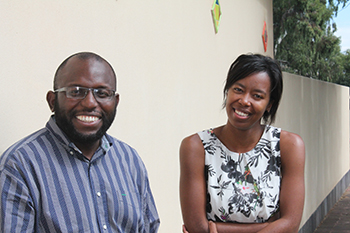
Oluwasegun Kuloyo and Zanele Matsane proved to be
Bloemfontein’s young and wittiest science researchers.
They will represent the Free State at the Famelab
national semifinals in Johannesburg.
Photo: Oteng Mpete
Imagine sharks with laser beams attached to their heads and enzymes that wear coats, and yeasts that stage a coup d’état in your body when agitated. This was all explored at the FameLab Science Communication Competition.
Hosting the FameLab regional competition was a collaborative effort between Dr Mikateko Hoppener, from the University of the Free State’s (UFS), the Centre for Research on Higher Education and Development (CRHED), and Edith Sempe from the Central University of Technology (CUT), Research and Development Unit. Taking place for the first time in the Free State, the event was held at the UFS Centenary Complex on 2 March 2017.
Witty minds make science fun
FameLab is a competition that promotes science and technology by creating a space for scientists to find their voices and reach public audiences. The Free State regional competition had 18 contestants and two emerged victorious on the day. Contestants had to ensure their three-minute talks were fun, charismatic, clear and entertaining.
The two regional winners were Oluwasegun Kuloyo, a PhD student with the department of Microbial Biochemical and Food Biotechnology at UFS, and Zanele Matsane, a Construction Management PhD student at CUT.
Kuloyo's research deals with the management of the candida yeast which exists in most people’s bodies and which, with a healthy immune system can be kept under control, but when an immune system is compromised, the yeast reacts volatilely and can potentially lead to death in HIV/AIDS patients.
Matsane’s research is centred on collaborative construction management inspired by the Toyota manufacturing process. She hopes to resolve the silos of construction and bring about a more harmonious and fluid process to construction projects, thus ensuring their successful completion.
The panel of judges consisted of Oteng Mpete UFS Media Liaison Officer, Dr Elizabeth Conradie from the CUT Innovation Hub, and Prof Willie du Preez from the CUT Centre for Rapid Prototyping and Manufacturing, as well as Robert Inglis from JiveMedia Africa.
Local scientists become jet-setters
The two regional winners will head to Johannesburg to compete at the FameLab national semifinals, and the South African winner will go on to compete against winners from over 30 countries on an international stage, at the Cheltenham Science Festival in the UK.
FameLab is a programme of the Cheltenham Science Festival and is implemented locally by the South African Agency for Science and Technology Advancement (SAASTA), the British Council, and JiveMedia Africa. The competition has been running in South Africa for the past five years.